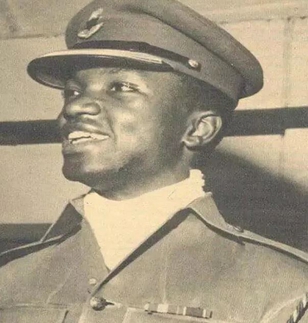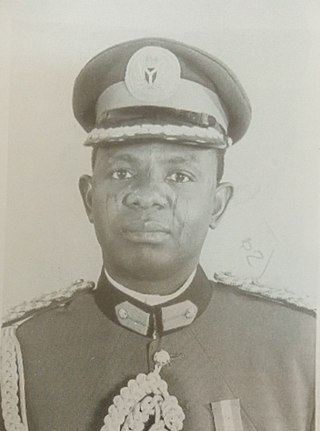Related Research Articles

Chukwuemeka "Emeka" Odumegwu Ojukwu was a Nigerian military officer and politician who served as President of the Republic of Biafra from 1967 to 1970 during the Nigerian Civil War. He previously served as military governor of the Eastern Region of Nigeria, which he declared as the independent state of Biafra.

Lieutenant-Colonel Patrick Chukwuma "Kaduna" Nzeogwu was a Nigerian military officer who played a leading role in the 1966 Nigerian coup d'état, which overthrew the First Nigerian Republic.
Lieutenant Colonel Bukar Suwa Dimka was a Nigerian military officer who played a leading role in the 13 February 1976 abortive military coup against the government of General Murtala Ramat Muhammed. Dimka had also participated in the Nigerian counter-coup of 1966 which toppled the government of General Aguiyi Ironsi.

Hassan Usman Katsina, titled Chiroman Katsina, was a Nigerian general who was the last Governor of Northern Nigeria. He served as Chief of Army Staff during the Nigerian Civil War and later became the Deputy Chief of Staff, Supreme Headquarters.

David Akpode Ejoor RCDS, PSC, was a Nigerian military officer who served as Chief of Army Staff (COAS).
The 1966 Nigerian Counter-coup was the second of many military coups in Nigeria. It was masterminded by Lt. Colonel Murtala Muhammed and many other northern military officers. The coup began as a mutiny at roughly midnight of 28 July 1966 and was a reaction to the killings of Northern politicians and officers by some soldiers on 15 January 1966. The coup resulted in the murder of Nigeria's first military Head of State General Johnson Aguiyi-Ironsi and Lt Colonel Adekunle Fajuyi in Ibadan by disgruntled northern non-commissioned officers (NCOs). Upon the termination of Ironsi's government, Lt. Colonel Yakubu Gowon was appointed Head of State by the coup conspirators.
Ibrahim Taiwo was a Military Governor of Kwara State from July 1975 to February 1976 during the military regime of General Murtala Mohammed. He assisted in establishment of the University of Ilorin, which was founded by decree August, 1975.
Colonel Anthony Aboki Ochefu was a Military Governor of East Central State from July 1975 to February 1976 during the military regime of General Murtala Mohammed.

Abba Kyari was a Nigerian military officer who served as governor of North-Central State, Nigeria after it was created from the Northern Region during the military regime of General Yakubu Gowon.
Joseph Akahan was a Nigerian military officer and Chief of Army Staff (Nigeria) from May 1967 until May 1968, when he was killed in a helicopter crash during the Nigerian Civil War.
Max Siollun is a Nigerian historian who specializes on Nigerian history with a particular focus on the Nigerian military and how it has affected Nigeria's socio-political trajectory from the pre-colonial era to the present. Siollun was educated in England, graduating from the University of London.

Iliya D. Bisalla was a Major General in the Nigerian Army and Commissioner of Defence under the military administration of General Murtala Mohammed, the 4th Nigerian Head of State.
Victor Adebukunola Banjo was a colonel in the Nigerian Army. He fought in the Biafran Army during the Nigerian Civil War. Banjo was accused of being a coup plotter against Nigerian Prime Minister Abubakar Tafawa Balewa by the government of Aguyi Ironsi. He was alleged to have staged a coup plot against Biafran President Odumegwu Ojukwu and was executed as a result. Ojukwu's first military judge stated that was not enough evidence to convict him of coup charges, but he was found guilty by a second military tribunal.
On 15 January 1966, rebellious soldiers carrying out a military putsch led by Kaduna Nzeogwu and 4 others, killed 22 people including the prime minister of Nigeria, many senior politicians, senior Army officers and their wives, and sentinels on protective duty. The coup plotters attacked the cities of Kaduna, Ibadan, and Lagos while also blockading the Niger and Benue River within a two-day timespan, before being subdued. The General Officer Commanding the Nigerian Army, Johnson Aguiyi-Ironsi, was falsely accused of having been compelled to take control of the government of a country in upheaval, inadvertently putting Nigeria's nascent democracy on hold His ascendancy to power was deemed a conspiracy by the coup plotters, who were partly Igbo and Majors from Yoruba and Hausa sub regions, to pave the way for General Aguiyi-Ironsi to be head of state of Nigeria. Consequently, the retaliatory events by Northern members of the Nigerian Army that led to deaths of many Igbo soldiers and civilians put the nation on a path that eventually led to a civil war.
Emmanuel Arinze Ifeajuna was a Nigerian army major and high jumper. He was the first Black African to win a gold medal at an international sports event when he won at the 1954 British Empire and Commonwealth Games. His winning mark and personal best of 6 ft 8 in (2.03 m) was a game record and a British Empire record at the time.
Ibrahim Ahmed Bako was a senior officer in the Nigerian Army who played a principal role in two Nigerian military coups: the July 1966 counter-coup and the December 1983 coup. The 1983 coup ousted the democratic government of Shehu Shagari while the July 1966 coup ousted the military government of General Ironsi. Bako was killed during the December 1983 coup d'état.

Major General Mohammed Shuwa was a Nigerian military officer and the first General Officer Commanding of the Nigerian Army's 1st Division. Shuwa commanded the 1st Division during the Nigerian Civil War. He was murdered in Maiduguri by suspected Boko Haram militants on 2 November 2012.
Christian Anuforo was a Nigerian Army major and one of the principal plotters of the 15 January 1966 coup, an event that derailed Nigeria's nascent democracy and introduced military rule to Nigeria.
Major Donatus Okafor was a Nigerian army officer, Commander of the Federal Guards Brigade, and one of the principal plotters of the January 15, 1966 coup, an event that derailed Nigeria's nascent democracy and introduced military rule to Nigeria.
Arthur Chinyelu Unegbe was a Nigerian military officer who was QuarterMaster-General, Army Headquarters, Lagos on January 15, 1966, the day of Nigeria's first coup.
References
- ↑ Siollun, Max. Oil, Politics and Violence: Nigeria's Military Coup Culture (1966-1976). Algora Publishing, 2009. p. 35. ISBN 9780875867106.
- 1 2 Omoigui, Nowa. "The Key Players of the 1966 Rebellions-Where Are They Today?". Gamji. Retrieved 28 January 2017.
- ↑ Siollun, Max. Oil, Politics and Violence: Nigeria's Military Coup Culture (1966-1976). Algora Publishing, 2009. p. 49. ISBN 9780875867106.
- ↑ Siollun, Max. Oil, Politics and Violence: Nigeria's Military Coup Culture (1966-1976). Algora Publishing, 2009. p. 52. ISBN 9780875867106.
- 1 2 Siollun, Max. Oil, Politics and Violence: Nigeria's Military Coup Culture (1966-1976). Algora Publishing, 2009. p. 241. ISBN 9780875867106.